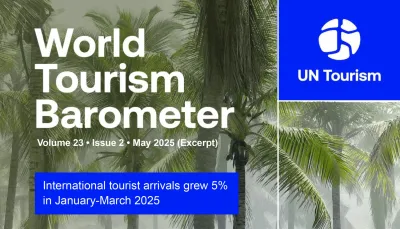Exploring the Frontier: Christian Watts on AI's Transformative Impact on the Travel Industry

Christian Watts, a reference in the travel and tourism industry, recently delivered a compelling presentation at the BAE Ventures Event "Walk The Talk: AI in Hospitality and Travel." Titled "Uncharted Territories: Exploring AI's Impact on the Travel Industry," Christian’s talk delved into the transformative potential of artificial intelligence (AI) in revolutionizing travel experiences and operations.
Christian Watts is renowned for his innovative contributions and entrepreneurial spirit within the travel sector. Christian’s engaging personality and willingness to share his insights have earned him great respect and admiration among his peers. His participation in industry events like "Walk the Talk: AI in Hospitality and Travel" reflects his commitment to sharing knowledge and fostering innovation in the travel industry.
As the founder and CEO of Magpie Travel, he has addressed significant challenges in content management for tour operators and resellers. Magpie Travel, established in 2019, simplifies and enhances the distribution of tour content, making it more effective and streamlined.
Christian' journey began as a pedicab driver near Fisherman’s Wharf in San Francisco. With a modest investment of $3,000, he and his friends launched City Sightseeing San Francisco, the city's first hop-on hop-off sightseeing service. Under his leadership, the company expanded from a single bus to a fleet of thirty, serving over 200,000 passengers annually. His frustration with the inefficiencies in managing tour content manually led to the creation of Magpie Travel, which has since attracted significant investments and industry recognition.
In his presentation, Christian explored the evolution of travel technology from 1841 to the present, highlighting the pivotal role AI plays in shaping the future of the industry. He emphasized that AI and machine learning are set to optimize travel experiences, enhance customer satisfaction, and simplify operations.
Christian provided an in-depth look at the ingredients and processes involved in creating large language models (LLMs), including data collection, tokenization, coding, human feedback, and deployment. He underscored the advancements in AI tools from 2023 to 2024, predicting that Artificial General Intelligence (AGI) could revolutionize intellectual labor within a few two years.
AI's potential to personalize travel experiences was a central theme in Christian' presentation. By analyzing user preferences and behaviors, AI can tailor travel itineraries to individual needs. AI-powered assistants offer 24/7 customer support, predictive analytics, dynamic pricing, and immersive VR/AR experiences. Operational efficiency is enhanced through automation in inventory management, scheduling, fraud detection, and security. Moreover, AI promotes sustainability by optimizing routes and advocating for eco-friendly travel options.
Looking ahead, Christian envisioned groundbreaking AI innovations in travel, such as hyper-reality travel, sentient travel advisors, and the teleportation of experiences. He discussed the potential of biometric personalization and AI-generated destinations, emphasizing the creation of dynamic ecosystems and cross-dimensional travel experiences. Christian also highlighted the importance of optimizing happiness in travel, drawing on Daniel Kahneman’s research on the difference between experience and memory, and identifying common human biases that AI can help overcome.
Christian Watts' insights and predictions provide a fascinating glimpse into the future of travel, where AI not only enhances operational efficiency and customer experiences but also plays a pivotal role in optimizing personal happiness and well-being.
To further explore the insights shared during his presentation, we sat down with Christian Watts for an in-depth Q&A, where he offered his expert perspective on the evolving role of AI in the travel industry.
How do you see AI balancing the need for technological efficiency with maintaining the human touch that is so integral to travel experiences?
AI has the potential to significantly enhance the travel experience by taking over repetitive and mundane tasks, thus allowing human staff to focus on more personalized and engaging interactions with customers. I don’t know who first came up with this phrase, but “Systemize the predictable so you can humanize the exceptional” sums it up well.
For example, AI can easily and efficiently handle tasks like initial customer inquiries, freeing up time for staff to create memorable and personalized experiences for travelers.The key is to leverage AI to augment human capabilities rather than replace them entirely.
Which future AI innovation in travel excites you the most, and why?
I believe the biggest changes ahead will be in the AI Agent space. All of us will have an AI agent that we manage (or manages us!).This agent will understand our fundamental goals and objectives, for both work and pleasure. These agents will have access to the worlds information, and be able to quickly filter and prioritize that data to instantly deliver what is relevant to us. More importantly, these agents will talk to other agents. These agents will represent people and businesses. Decision making can then largely be made between agents, only involving humans for verification, or in places where the decision making is pleasurable.
How do you think the travel industry will evolve over the next decade with the advancements in AI and other technologies?
On one hand, the final travel experience could and should be one of the least affected areas of our lives. Whether it's a day at the beach, a hike in the mountains, dinner in the historic plaza, or sightseeing in a new city, these actual experiences are probably not where most humans would like to see significant changes. The job of AI and other technology is to fix everything that happens before that. Discovering, booking and getting you to those experiences is the part we need to optimize. The B2B layers of the industry are where we’ll see disruption.
What are the potential implications of Artificial General Intelligence on the travel industry, and how should companies prepare for it?
Nobody knows where this will take us, so everybody needs to be able to move with the advancements. It’s conceivable that companies and products that used to take years or decades to build, could soon be replicated in a few weeks or months. Even without initial distribution, this could be extremely disruptive for even the largest players in the industry.
It's crucial to foster a culture of innovation and agility within the organization to quickly adapt to the rapid advancements in AI. Partnerships with tech companies and ongoing training for staff to work alongside advanced AI systems will be key to staying competitive. Larger companies should start preparing by investing in current AI technologies and building a strong data infrastructure.
What advice would you give to entrepreneurs looking to attract investment in AI-driven travel startups?
First and foremost, clearly articulate the problem your AI-driven solution addresses and how it improves the travel experience or operational efficiency. That’s your value proposition.
Assuming you can do that, you also need to show how you’re building a moat. Today, in AI you need a moat to defend from legacy travel companies, other start-ups and also the LLMs themselves. With the help of AI, everybody can build really innovative products with very little money. Everybody has access to the same AI. What makes you special?
The other thing you need to show is how you’re going to make some money. That’s your Go-To-Market strategy. How will you acquire customers? This is where most companies fail. If it’s B2C (good luck), how are you going to break through without giving every last penny to Google (the answer is NOT through influencers on TikTok).
If it’s B2B, you need to demonstrate excellent industry knowledge and understanding.
Building a network with industry leaders and attending relevant conferences is a great way to get early feedback on your ideas, and also to meet potential investors and partners. Don’t be shy to tell people about your plans. Success is not about ideas. There are plenty of ideas. Implementation is the key.
In conclusion, Christian Watts' exploration of AI's transformative impact on the travel industry underscores the immense potential of these technologies to revolutionize both the operational and experiential aspects of travel. By blending technological advancements with human ingenuity, AI can enhance efficiency, personalization, and customer satisfaction while preserving the essence of travel experiences that make them memorable. As the industry navigates these uncharted territories, Christian's insights serve as a valuable guide, emphasizing the importance of innovation, agility, and a clear value proposition for those looking to thrive in this rapidly evolving landscape. The future of travel, as envisioned by Christian, is not just about efficiency but also about optimizing human happiness and creating unforgettable journeys.



